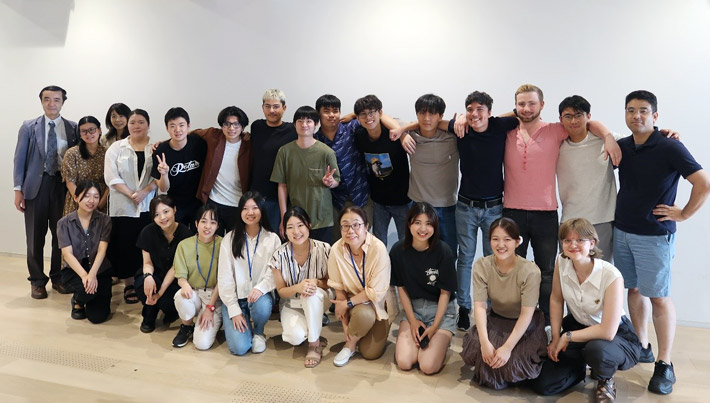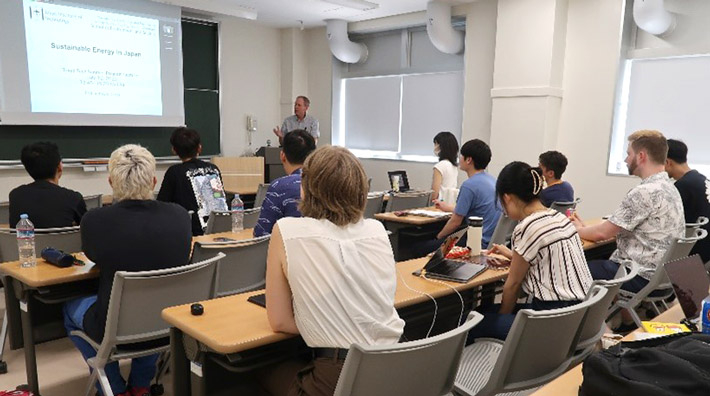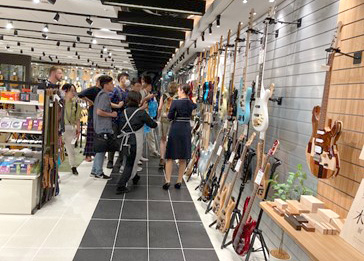Tokyo Tech's Center for International Education hosted the Engineering Design for Social Resilience Summer Program from July 3 to 28, bringing together 17 participants from the Institute and other educational institutions around the world. This was the first time in four years that the Summer Program was held in person.

Tokyo Tech Summer Program 2023 participants
As the world faces numerous far-reaching challenges such as the COVID-19 pandemic and other public health issues, climate change caused by global warming, and various forms of natural disasters, there are growing expectations for humans and technology to work together to create a more resilient society. This year's Summer Program offered an opportunity to examine future technologies that may provide solutions to these challenges through lectures and lab experiences in the fields of "AI, health, and wellbeing," "disaster prevention and design," and "energy issues," all of which are being actively researched at Tokyo Tech.
Lectures and lab immersion
To kick things off, students at the program orientation session heard from Professor Miki Saijo, who is also the director of the Tokyo Tech Summer Program. Saijo spoke to the program participants about the concepts and definitions of social resilience and engineering design, touching also on the historical background, prior research, and practical examples of these areas.
Over the next three days, the program participants enjoyed the following lectures by Tokyo Tech faculty members:
- Engineering design and disaster prevention technology
Associate Professor Takumi Ohashi, School of Environment and Society
- Future sustainable health conditioning society realized by open innovation
Professor and Vice President for International Affairs Nobuhiro Hayashi
- Sustainable energy in Japan
Professor Jeffrey Scott Cross, School of Environment and Society

Lecture on sustainable energy in Japan by Prof. Cross
After the lecture sessions, the participants were offered the opportunity to join one of several laboratories for a period of seven days. This immersion allowed them to deepen their understanding regarding important experiments and analyses in the research fields that were of interest to them.
Throughout the program, weekly homeroom activities to discuss student progress were led by Associate Professor Saho Kawashima, a specialist in writing and communications. This allowed students to emphasize and probe further any topics that they found particularly interesting, and to address questions about technology in their home countries, all of which were used as a basis for their essays and presentations.
Fieldwork and cultural exchange

At cultural exchange event discussing resilience and sustainable topics related to musical instruments
The program also included a day of fieldwork during which the participants visited Haneda Chronogate, a massive logistics facility run by Yamato Transport Co., Ltd., to learn about sustainable delivering management systems. The students also received training in disaster prevention at the Tokyo Fire Department's Life Safety Learning Center.
At a more relaxed cultural exchange event, the participants enjoyed playing various musical instruments during the Yamaha Ginza Shop tour. With its well-designed acoustics, soundproof facilities, and earthquake-resistant structure, the building also offered a glimpse of resilient architecture in Japan.
Another popular cultural event among the students was a tranquil tea ceremony held at the International House on Ookayama Campus. Here, the participants were able to experience the peaceful space and time that teamaking creates in resilient Japanese daily life.
Group presentations on final day
On the final day, the participating students gave group presentations about what they had learned during the program, and suggested possible technologies that could create a more resilient society in the future.
At the closing ceremony, Professor Saijo offered the students some final encouragement with her comments on the group presentations. Vice President Hayashi presented the students with their certificate of completion and invited everyone back to Tokyo Tech through future opportunities such as the International Graduate Program.
While exploring ways to create a more resilient global society, the participants of the Tokyo Tech Summer Program once again forged many new friendships regardless of nationality, language, or specialization. All those involved in the program look forwarding to witnessing how these students apply their newly acquired knowledge in their future study and research.
Comments from participating students
- It was an enriching experience with a lot of support from Tokyo Tech! I had an amazing time learning Japanese culture as well as interacting with the Japanese students. The program taught me many things about engineering design which is beneficial to my future career! (Nanyang Technological University, Singapore)
- It was fun to talk to people around the world. (University of Washington, USA)
- At first, I was worried about being able to speak English and talk to someone from another country. But every international student and Japanese student was very friendly and helpful. So, I really enjoyed the activities with them in this program! I think it was a good choice for me to join this program, and I could meet great people. I would like to thank all the people who helped to run this program. (Tokyo Tech)
- With the Tokyo Tech Summer program, I was able to get an insight into the diverse study culture of Tokyo Tech. Also, it allowed to meet international students from all around the world as well as local students from Tokyo Tech. I had a great time and learned a lot, thank you! (Technical University Berlin, Germany)
- I cannot express enough how grateful I am for the Summer Program 2023. Learning proteomics with AI under the expert guidance of the Hayashi Lab was an unparalleled opportunity. The hands-on experience with advanced technologies opened my eyes to the exciting potential of this field. It was also inspiring to connect with peers from different countries and share ideas in a dynamic and intellectually stimulating setting. (Tokyo Tech)
- Thank you very much for having such a great Summer Program! Though I have lived in Japan for more than twenty years, I realized that there is a lot more to know about Japanese culture, society and so on. Also, I was really impressed by the exchange students being eager to absorb everything from their experience. A lot of activities with them motivated me to try something and learn from it. In this program, I visited Prof. Hayashi's lab, which has many facilities for experiments, for the first time. Since my major is quite different from what I did there, the experience was very eye-opening. Though I had little knowledge of proteomics, which is the main topic of the lab, the members there were so nice that they explained everything very clearly. I would like to say thank you again to all those who supported this program. Lastly, I am looking forward to reuniting with you all someday! (Tokyo Tech)
- It was an excellent experience to live in Japan and experience an insight of a different lifestyle. (RWTH Aachen University, Germany)
- I had many good experiences through the Summer Program. The most interesting activities were the group work, field work in Ginza, and lab work. To be honest, I had no confidence in having discussions within groups in English before the Summer Program. However, other students were so kind, and they taught me the meaning of the words I didn't know, and they rephrased when I didn't understand them. I was able to overcome the difficulty of communicating in English. During the lab work, I went to another lab for about one week, and I learned about the research topic and experimental methods. The lab research is completely different from my thesis in my lab. So, I gained new perspectives. The field work in Ginza was also excellent. We went to a Japanese traditional sweet shop, a stationery store, and a big musical instrument store. We introduce our own countries goods and foods to each other. I spoke English the whole day and every day for a month. I really enjoyed it, made many friends from many countries, and had a valuable experience. (Tokyo Tech)
- The Summer Program has been one of the best months in my life. In addition to giving me a glimpse into Japanese daily life, working alongside the other friendly members, TAs, and professors has been a great experience. Fond memories have been forged that I will cherish for all my life. I am glad I made the choice to apply to the Summer Program 2023 and am very grateful to Tokyo Tech for accepting me into their wonderful program. (RWTH Aachen University, Germany)
- I am really glad I was able to join in this program and bond with international students from all over the world. We all had different backgrounds and it was exciting to learn about their cultures as well as their majors and fields of study. During the lab activities, I spent a lot of time with my team members and I cannot thank them enough for their amazing work and brilliant ideas! (Tokyo Tech)
- Dear Summer Program participants, professors, and staff, I am incredibly grateful for everything this program has offered me. It has been a transformative experience, helping me improve my socializing and communication skills, among many other things. I would like to express my heartfelt thanks to the staff and professors for creating such a wonderful program that allowed me to meet and connect with other students. This opportunity has been invaluable, not just in terms of communication but also in learning how to live abroad. I look forward to seeing all of you again soon. Thank you! (King Mongkut's Institute of Technology Ladkrabang, Thailand)






